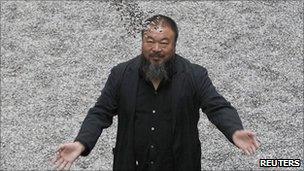Chinese artist Ai Weiwei held for 'economic crimes'
- Published

Ai Weiwei: Not seen since he was stopped trying to board a Hong Kong-bound plane
China's foreign ministry has confirmed that police are investigating artist Ai Weiwei for suspected economic crimes.
Mr Ai, who co-designed the Beijing Olympic stadium known as the Bird's Nest, was detained by officials at Beijing airport on Sunday.
The man often described as China's most famous contemporary artist is also one of the government's fiercest critics.
Meanwhile, another campaigner says he was force-fed milk powder through the nose while on prison hunger strike.
Zhao Lianhai is a writer who campaigned for the victims of a 2008 scandal over tainted milk powder after his son's health was affected.
'Rule of law'
Mr Ai is a vocal critic of the Chinese government, complaining about a lack of basic rights and freedoms and often incorporating these political themes into his work.
There had been no official information about his whereabouts since being detained on Sunday until China's state news agency, Xinhua, released a one-line report saying he was under investigation by police.
The report later appeared to have been removed from the agency's website, but the investigation was then confirmed by China's foreign ministry.
"Ai Weiwei is under investigation on suspicion of economic crimes," foreign ministry spokesman Hong Lei told reporters.
Foreign governments have called for Ai Weiwei's immediate release, but Mr Hong brushed off the criticism.
"China is a country ruled by law and will act according to law. We hope that the countries concerned will respect China's decision," he said.
"This has nothing to do with human rights or freedom of expression."
Mr Ai's wife, Lu Qing, told reporters their home had been raided on Sunday by more than 40 police who seized computers and money.
She said he had "felt a premonition that he would be detained".
She is also concerned for his health, saying the 53-year old artist takes medicine for a range of illnesses.
Torture allegation
The BBC's Jo Floto in Beijing says Mr Ai, the son of a prominent communist, had appeared to enjoy a degree of protection.
In the last couple of months, dozens of activists have ended up in custody or house arrest, none of them as open in their criticism as Mr Ai.
The news that he is being investigated for economic crimes may signal that China's authorities will seek to characterise him as a common criminal, rather than a political prisoner, our correspondent says.
The authorities' detention of Mr Ai has also inadvertently highlighted the treatment of another dissident, Zhao Lianhai - a Beijing writer whose son was one of about 300,000 made ill in 2008 by drinking infant formula tainted with melamine.
Mr Zhao was sentenced to two-and-a-half years in prison in November after organising a parents' support group and campaigning for compensation, though he was freed on medical parole in December.
In an interview with the South China Morning Post, Mr Zhao claimed he had been force-fed through the nose with a milk-powder solution for two days by medical staff in a detention centre in a Beijing suburb after going on hunger strike to protest against his sentence.
"They used mainland-produced milk powder during the first force-feeding. I threw up for half an hour."
The SCMP said the interview was carried out in March but held for publication in the event Mr Zhao was returned to police custody.
Mr Zhao was detained on Wednesday after publicly calling for Mr Ai's release, the SCMP said, but posted a message on his Twitter account just before midnight to say he had returned home.
Crackdown
Concerns about Mr Ai's detention have been raised by a number of governments, including the US, Britain and Germany.
On Wednesday the US ambassador to China, Jon Huntsman, said the artist was among those who "challenge the Chinese government to serve the public in all cases and at all times".
Human rights groups say China's current crackdown on dissent is a response to protests in the Middle East and North Africa.
Human Rights Watch said up to 25 lawyers, activists and bloggers had been either detained, arrested or had disappeared. Dozens more had been subjected to harassment, it said.
Mr Ai currently has an exhibition at the Tate Modern gallery in London, displaying 100 million porcelain objects that look like sunflower seeds.
- Published20 July 2012
- Published7 April 2011
- Published5 April 2011
- Published22 November 2010
- Published4 April 2011
- Published12 January 2011
- Published8 November 2010
- Published6 November 2010